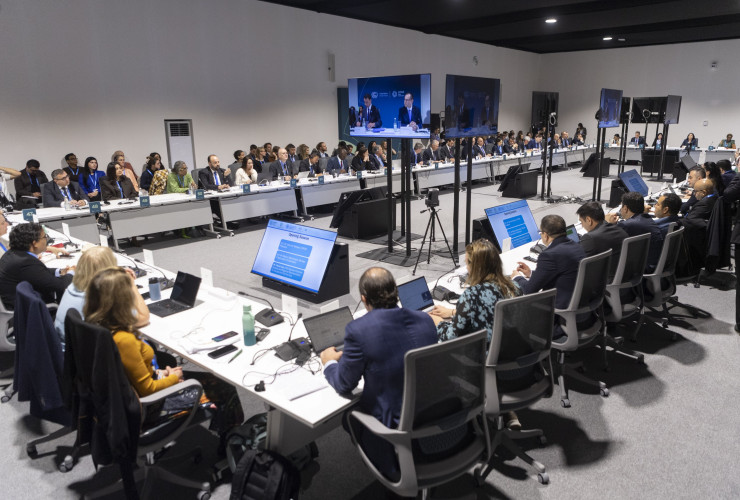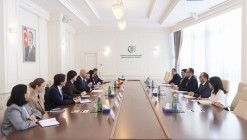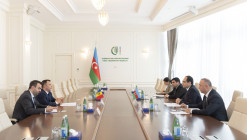
The "Launch of the Baku Harmony Climate Initiative for Farmers: Expanding opportunities for farmers to build resilience to climate change" was officially launched at the 29th session of the Conference of the Parties to the United Nations Framework Convention on Climate Change (COP29) in Baku.
This important initiative, formed in collaboration with the COP29 Presidency, the Ministry of Agriculture and the Food and Agriculture Organization of the United Nations (FAO), aims to promote climate change adaptation and sustainable development in agriculture, food systems, and water management.
The panel discussion held at the "Food, Agriculture and Water Day" was moderated by Kaveh Zahedi, Director of the Office for Climate Change, Biodiversity and Environment of the Food and Agriculture Organization of the United Nations (FAO).
Speaking at the event, COP29 President Mukhtar Babayev said that the international climate conference hosted by the capital Baku, as in other COPs, has formed global initiatives - calls for action for the world community. One of the 14 global initiatives for COP29, the "Baku Harmony Climate Initiative" for Farmers, which includes agriculture, environment and climate issues, is one of the main goals of the initiative, which is to expand the opportunities of rural communities, women and youth and increase the resilience of agriculture to climate change. The COP29 President said that within the framework of the "Harmony" initiative, sustainable agricultural development will play an important role in combating climate change at the local and global levels.
Minister of Agriculture Majnun Mammadov emphasized that the goals of "Harmony" are simple but important. The Minister said that first of all, the "Harmony" initiative is intended as a platform that unites global efforts to transform agri-food systems into a more sustainable and sustainable model by bringing together stakeholders in building climate-resilient agricultural systems. This initiative, which will play a kind of aggregator role in promoting adaptation measures in the agricultural sector, will bring together networks and coalitions, benefit from their strength, and ensure the exchange of experience. In other words, this platform will play an indispensable role in helping farmers gain practical knowledge, access to digital tools, and become familiar with the world's best practices and innovations. Secondly, this initiative will support the transformation of agricultural systems and will allow mobilizing investments that support sustainable agriculture. The initiative aims to introduce new climate finance tools and projects through collaboration between international organizations, public and private institutions, as well as all partners, to make investments more accessible and effective.
Third, the Harmony initiative will play a key role in empowering farmers, especially women and youth, who are the backbone of agriculture and the main drivers of future sustainability. By providing them with the necessary tools, training and climate finance, Harmony will encourage farming communities and farmers to continuously improve their practices.
Viorel Gutu, FAO Regional Representative for Europe and Central Asia, stressed that climate change has affected many sectors of the economy in recent years, including agriculture. He highlighted the importance of supporting the activities of rural communities, women and youth, and paying special attention to climate finance as part of the fight against climate change: "Initiatives, coalitions, networks and partnerships related to agri-food systems, climate change and finance have developed significantly over the past 10 years. At the same time, more coordination is needed to implement more effective climate measures and achieve a faster transformation of agri-food systems. The Harmony Initiative is very important in this regard. "After the official opening ceremony, a panel session was held on the topic "Why is Harmony important? What gaps will this initiative address?" Speaking at the session, Deputy Minister of Agriculture Ilhama Gadimova emphasized that the agricultural sector plays an important role in ensuring employment in the regions, including in the formation of incomes of rural communities, women and youth, and that this initiative will promote digital literacy of women and youth in the fight against climate change, provide access to digital tools, and support individual farms.
Speaking at the panel discussions, Shobha Shetty, Global Director for Agriculture and Food of the World Bank, Jemimah Njuki, Head of the Economic Development Division of UN Women, Andrea Porro, Secretary General of the World Farmers Organization and other speakers emphasized the importance of global cooperation in the fight against climate change and their support for the Baku Harmony Climate Initiative for Farmers, which includes a comprehensive approach in this direction.
The panel discussions continued in a question-and-answer format.

The 6th meeting of the joint intergovernmental commission on economic cooperation between the Republic of Azerbaijan and the Republic of Moldova was held in Baku
11 April 2025

Minister of Agriculture Majnun Mammadov met with Moldovan delegation
09 April 2025

Minister Majnun Mammadov met with the Ambassador of Moldova to Azerbaijan
09 April 2025

A panel discussion was held on the topic of “Just Transition in the Agriculture-Food System: Integration in Accordance with the COP29 Harmony Initiative” within the framework of COP29
21 November 2024

A panel discussion on achieving sustainable agro-food systems was held within the framework of COP29
21 November 2024